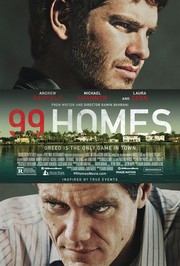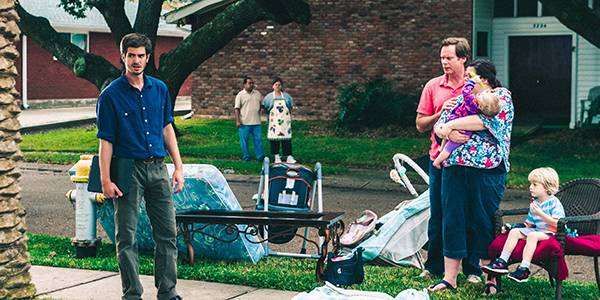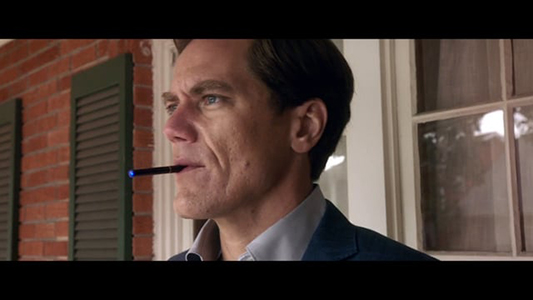Moral interludes, a classic form of theater, derive their form from short plays and are intended for educational purpose. They were the bridge between longer medieval morality plays and early Tudor dramas. This film is a direct call back to this classic form. Our protagonist, Dennis Nash (Andrew Garfield), is faced with the moral quandary of how to save his home and life: either choose to continue the ethically-correct life he has relied on, or pursue a less-principled solution.
Set amidst the backdrop of the 2008 housing market catastrophe, Dennis Nash, a hard-working and honest man, can’t save his family home despite his best efforts. Thrown to the streets with alarming precision by real estate shark Mike Carver, Dennis, out of work and luck, is given a unique opportunity – to join Carver’s crew and put others through the harrowing ordeal done to him in order to earn back what’s his. Delicately training his eye on the rigorous details, the reliably astute Ramin Bahrani imbues his characters with icy complexity to achieve his compassionate portrait of a man whose integrity has become ensnared within an all-too-relevant American crisis. With precision and care, Bahrani’s provocative character study applies all the cinematic tools at his disposal to explore the ethical dilemma at the heart of man’s struggle to reach higher – by whatever means necessary. (Synopsis by Broad Green Pictures)
Estimates of the impact of the mortgage crisis show that approximately 3.4% of all mortgages were in foreclosure as of May 2012. By comparison, at the peak of the great depression the foreclosure rate never exceeded 1%. Even more concerning, the impact of the subprime crisis was not felt evenly across demographics, disproportionally affecting non-white consumers. While the causes of the crisis are varied and complicated, “99 Homes” sticks to a simpler story lines that “everyone was wrong.” This allows for the focus to remain on the morality of individual actions by Nash, his family, and Rick Carver (Michael Shannon).
Throughout the film there is a thread of hopelessness and anger that exists separate from the major character developments. Again and again we are shown short clips of ordinary people whose lives are being upended as Nash removes them from their homes. Families, couples starting out in life, and most emotional, an elderly man who doesn’t understand what is happening and has nowhere to go. In a film that could stand alone on the strength of the main storylines, this is an inspired choice to show the broader ramifications of the major plot points while reinforcing the ethical quandary being dissected. Brought full circle, the effect of this burden is shown on Nash until it ultimately consumes who he is.
This is one of the best-written and acted films to come out this year. What could easily have slipped into eye-rolling morality preaching becomes much more visceral on the strength of the acting and imagery. There is a thin line to walk between establishing the point and hammering it home too many times. Director Ramin Bahrani does an exceptional job of maintaining the pacing without drifting too far off course. The resolution falters slightly, but that could be argued is more a problem with the expectations of an audience in the modern day. This is a film that is as much about the discussion as it is the conclusion of the idea.
Much of the backdrop is a one-sided story of greedy banks and realtors profiting at the expense of the average homeowner. While that is a fair criticism, it has to be this way for the larger morality discussion to work. Nash is forced into his moralistic quandary by being one of those victims. The reasons cease to matter in the examination of what it means to be successful in the post-recession world. As it is shown repeatedly, Nash is not the only victim, both above and below in the social strata. His choices define who he becomes, just as the choices of those he has affected color their future.
Just as the moral interlude was a transition to the drama genre, there is a larger context here that all of us are still living with. We still have not recovered from the housing market collapse. Not just individuals, but as a collective society we have had to redefine what we are willing to do to get by. The real strength of this film is that while it entertains, it also forces us to confront how we are living in the real world. How far are we willing to go to maintain our lives? How about to survive?
THREE out of four stars.
Directed by Ramin Bahrani
Runtime 1 hr. 52 min.
Rated R for language including some sexual references, and a brief violent image.






Leave a Reply
You must be logged in to post a comment.